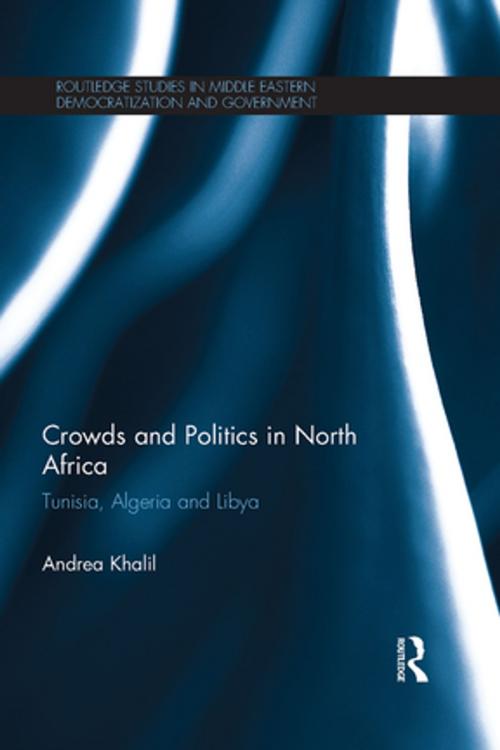Crowds and Politics in North Africa
Tunisia, Algeria and Libya
Nonfiction, Social & Cultural Studies, Political Science, Government, Democracy, Social Science| Author: | Andrea Khalil | ISBN: | 9781317810315 |
| Publisher: | Taylor and Francis | Publication: | March 26, 2014 |
| Imprint: | Routledge | Language: | English |
| Author: | Andrea Khalil |
| ISBN: | 9781317810315 |
| Publisher: | Taylor and Francis |
| Publication: | March 26, 2014 |
| Imprint: | Routledge |
| Language: | English |
This book takes predominant crowd theory to task, questioning received ideas about ‘mob psychology’ that remain prevalent today. It is a synchronic study of crowds, crowd dynamics and the relationships of crowds to political power in Tunisia, Libya and Algeria (2011-2013) that has far reaching implications embedded in its thesis.
One central theme of the book is gender, providing an in-depth look at women’s participation in the recent uprisings and crowds of 2011-2013 and the subsequent gender-related aspects of political transitions. The book also focuses on the social and political dynamics of tribalism and group belonging (‘asabiyya), including analysis and discussions with Libyan regional tribal chiefs, Libyan and Tunisian tribal members and citizens regarding their notions of tribal belonging. Crowd language and literature are also central to the book’s discussion of how crowds represent themselves, how we as observers represent crowds, and how crowds confront languages of authoritarianism and subjugation.
Crowds and Politics in North Africa includes interviews with crowd participants and key civil society actors from Tunisia, Libya and Algeria. Among these, there are numerous interviews with Benghazi residents, activists and tribal leaders. One of the original case studies in the book is the crowd dynamics during and after the attack on the US consular installation in Benghazi, Libya. The book presents interviews and fieldwork within a literary and cultural theoretical context showing how crowds in the region resonate in forms of cultural resistance to authoritarianism. A valuable resource, this book will be of use to students and scholars with an interest in North African culture, society and politics more broadly.
This book takes predominant crowd theory to task, questioning received ideas about ‘mob psychology’ that remain prevalent today. It is a synchronic study of crowds, crowd dynamics and the relationships of crowds to political power in Tunisia, Libya and Algeria (2011-2013) that has far reaching implications embedded in its thesis.
One central theme of the book is gender, providing an in-depth look at women’s participation in the recent uprisings and crowds of 2011-2013 and the subsequent gender-related aspects of political transitions. The book also focuses on the social and political dynamics of tribalism and group belonging (‘asabiyya), including analysis and discussions with Libyan regional tribal chiefs, Libyan and Tunisian tribal members and citizens regarding their notions of tribal belonging. Crowd language and literature are also central to the book’s discussion of how crowds represent themselves, how we as observers represent crowds, and how crowds confront languages of authoritarianism and subjugation.
Crowds and Politics in North Africa includes interviews with crowd participants and key civil society actors from Tunisia, Libya and Algeria. Among these, there are numerous interviews with Benghazi residents, activists and tribal leaders. One of the original case studies in the book is the crowd dynamics during and after the attack on the US consular installation in Benghazi, Libya. The book presents interviews and fieldwork within a literary and cultural theoretical context showing how crowds in the region resonate in forms of cultural resistance to authoritarianism. A valuable resource, this book will be of use to students and scholars with an interest in North African culture, society and politics more broadly.















